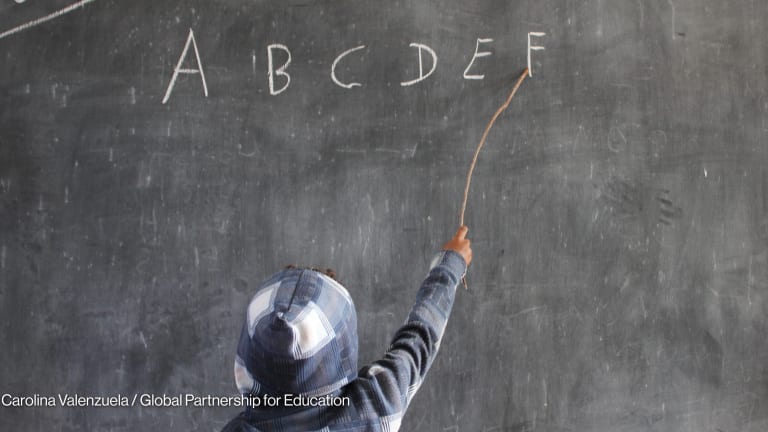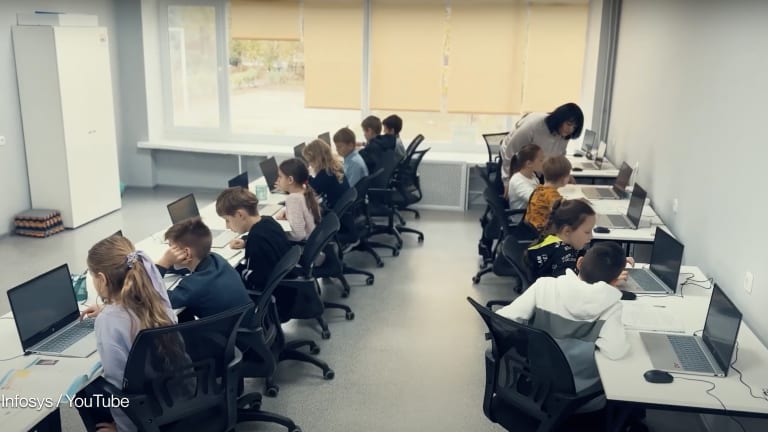
The first COVID-19 deaths last month in Niger, a landlocked country that ranks 189th in the human development index, marked a new milestone in the coronavirus crisis. A pandemic that spread in a matter of weeks across some of the world’s major advanced and emerging economies, bringing with it untold human suffering, is now hitting some of the world’s poorest and most fragile; and it could hit them hard.
Socio-economic challenges must be addressed in COVID-19 response, UNDP chief says
Achim Steiner speaks with Devex about a need to focus on the socio-economic impacts of the COVID-19 crisis even as the immediate health response unfolds.
The 2007-08 global economic and financial crisis showed that no country is immune from the impact of a global shock. Today’s crisis is unfolding against a backdrop of already-strained global trade, stagnating foreign aid budgets, tumbling commodity prices, protracted conflicts, and constrained fiscal space in developing countries.
Large groups of people with precarious jobs will fall back into poverty in countries today classified as “middle-income,” reminding us once again how misleading it is to classify countries by income instead of resilience. Women will be among the hardest hit. Small island developing states whose economies depend largely on tourism risk freefalling into economic collapse. And just as this disease knows no borders, in war-torn countries, it won’t pick sides. Last month saw the first reported COVID-19 death in Syria, whose health system is already ravaged by a decade of war.
It will take time to evaluate the impact of the damage to our economies and societies — and to rebuild them to be more sustainable and resilient. But only five years into the implementation of the Sustainable Development Goals, we cannot wait to take the collective action that could make a difference. As Ethiopian Prime Minister and Nobel laureate Abi Ahmed aptly reminds us, left undefeated in Africa, COVID-19 will bounce back elsewhere.
Here are six things that we urge governments and business leaders to act on now.
1. Governments need to boost foreign aid spending now, and sustain it
The $2 billion COVID-19 humanitarian appeal sets out the immediate needs of the countries most vulnerable to a surge of disease that has already crippled advanced health systems. Aid efforts will need to be sustained over time. We cannot afford to see a repeat of the “Ebola surges” experienced by some countries, where an influx of humanitarian aid dried up quickly with little or no resources to support communities — or entire economies — to get back on track. We must not lose sight of the role of foreign aid in building global resilience — including pandemic threats.
2. Scarce medical supplies directed to communities where they will have the most impact, rather than the highest bidder
Media coverage in recent days has cast light on how, even within some of the world’s advanced economies, governments are competing with one another for ventilators and protective equipment. Left unchecked, the same may happen for any vaccination or cure when it emerges. If this is happening in countries with good health systems and strong bargaining power, imagine how such competition will affect those that have neither.
3. Borders must be kept open to goods and services
Even where temporary restrictions on the movement of people become necessary to contain the spread of disease, we need to ensure that this does not hamper trade between countries. In many regions, cross-border trade in agricultural goods is the lifeblood of entire economies. The Sahel and West Africa are home to a looming food emergency, with some 14.4 million people already expected to face crisis or worse less than six months from now. Without immediate action, the COVID-19 crisis will fuel these and other emergencies.
4. Business leaders have a unique opportunity to slash the cost of remittances to developing countries
One billion people worldwide benefit from remittances — funds sent by migrant workers and family members abroad. In times of crisis, these funds can be a lifeline, especially in countries with limited social safety nets. Yet sending money home costs around 7% of the amount being sent. This is too high. If ever there was a time for the financial sector to rise to the challenge and slash transfer fees for the world’s most vulnerable people, it is now.
5. Rising debt needs to be addressed urgently
Many countries are showing signs of debt distress that could be compounded by this crisis. Addressing it may be harder now than 15 or 20 years ago — a growing share lies with private debt and non-Paris club lenders, and declining commodity prices make the problem worse.
The World Bank and International Monetary Fund have called for a suspension of debt repayments for the poorest countries. The Organisation for Economic Co-operation and Development has gone further, urging leaders to consider a “highly indebted poor countries initiative on steroids.” Lenders need to come together now to tackle this together.
6. Tackling one crisis must not come at the expense of others
Our efforts to support countries ravaged by COVID-19 cannot be allowed to divert resources from existing crises — addressing the needs of refugees; tackling the global climate emergency; ending violence against women and girls; ending discrimination in all its forms.
How stimulus plans are implemented today matters. In many countries, inequalities were already at record high levels. The global recovery needs to be fair, it needs to be green, and above all, it must be inclusive.
The nature of COVID-19 and its profound impact on livelihoods across the world may be new. Our approach to overcoming it, however, need not be.
This year, the United Nations will celebrate its seventy-fifth anniversary. OECD will mark its sixtieth. We may not be young, but with age comes the benefit of accumulated experience. Our organizations were born from the ashes of two world wars and the recognition that international cooperation is the only way to overcome truly global challenges.
It is our hope that at this crucial moment, we can show that working together in international solidarity — at the service of the most vulnerable – remains the only solution to the challenges of today and tomorrow.
Visit our dedicated COVID-19 page for news, job opportunities, and funding insights.










